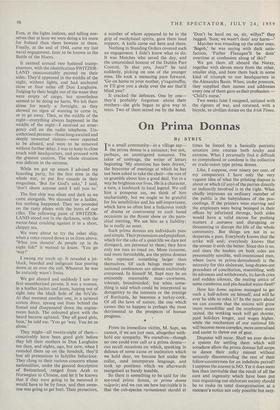On Prima Donnas
By STRIX
IN a small community—in a village say— the prima donna is a nuisance; but not, perhaps, an unmitigated nuisance. The taker of umbrage, the writer of letters beginning 'My attention has been drawn,' the boycotter of meetings at which he has not been asked to take the chair—the rest of . us grumble about him a good deal. Yet in a way he brightens our lives. He is a character, a turn, a landmark in local legend. We call him a pompous ass, we think of him uncharitably, but we ought to be grateful for his sensibilities and his self-importance, which have so often lent a ludicrous touch of drama or controversy to such banal occasions as the flower show or the paro- chial meeting, We see him as a liability; he is really an asset.
Such prima donnas are individuals pure and simple. Their pretensions and prejudices, which for the sake of a quiet life we dare not disregard, are personal to them; they have only ten toes to tread on. More tiresome, and more formidable, are the prima donnas who represent something larger than themselves. Of such beings many inter- national conferences are almost exclusively composed. In himself M. Sapt may be an eminently reasonable man—courteous, tolerant, broadminded; but when some- thing is said which could be interpreted as derogatory to the interests or the prestige of Ruritania, he becomes a turkey-cock. Of all the laws of nature, the one which causes this to happen is perhaps the most detrimental to the prospects of human progress.
From its immediate victim, M. Sapt, we cannot, if we are just men, altogether with- hold our sympathy. We ourselves—though no one could ever call us a prima donna— can recall occasions on which, speaking in defence of some cause or institution which we hold dear, we became hot under the collar, used intemperate language, and took up positions which we afterwards recognised as barely tenable.
So there is something to be said for the ten-toed prima donna, or prima donna vulgaris; and we can see how inevitable it is that the sub-species ruritaniensis should at
times be forced by a basically patriotic emotion into courses both tetchy and extreme. What I personally find it difficult to comprehend or condone is the collective or trade-union type prima donna.
Like, I suppose, over ninety per cent, of my compatriots I have only the very vaguest idea of what the printing dispute is about or which (if any) of the parties directly or indirectly involved is in the right. What chiefly impresses an ordinary member of the public is the babyishness of the pro- ceedings. If the printers were starving and the employers were being besieged in their offices by infuriated throngs, both sides would have a valid excuse for pushing matters a outrance and disrupting or threatening to disrupt the life of the whole community. But things are not in so desperate a pass. Everybody knows that the strike will end; everybody knows that the sooner it ends the better. Since this is so, and since the leaders on both sides are presumably sensible, well-intentioned men, where (save in prima-donnahood) is the necessity for this elaborate, long-drawn-out procedure of conciliation, resembling, with its advances and withdrawals, its harsh cries and sudden silences, the mating antics of some cumbrous and pin-headed water-fowl?
How has homo sapiens managed to get such a half-nelson on himself, and will he ever be able to relax it? In the years ahead we can assume that the unions will grow more monolithic and the employers more united, the working week will get shorter, paid holidays longer, and wages higher, while the mechanism of our national life will become more complex, more centralised and easier to throw out of gear.
Disputes will recur. Shall we ever devise a system for settling them which will somehow allow the prima donnas full scope to dance their sulky minuet without seriously discommoding the rest of their fellow-countrymen for an indefinite period? I suppose the answer is NO. Yet it does seem less than inevitable that the result of all the care and ingenuity which have been put into organising our elaborate society should be to make its total disorganisation at a moment's notice not only possible but easy.






































 Previous page
Previous page